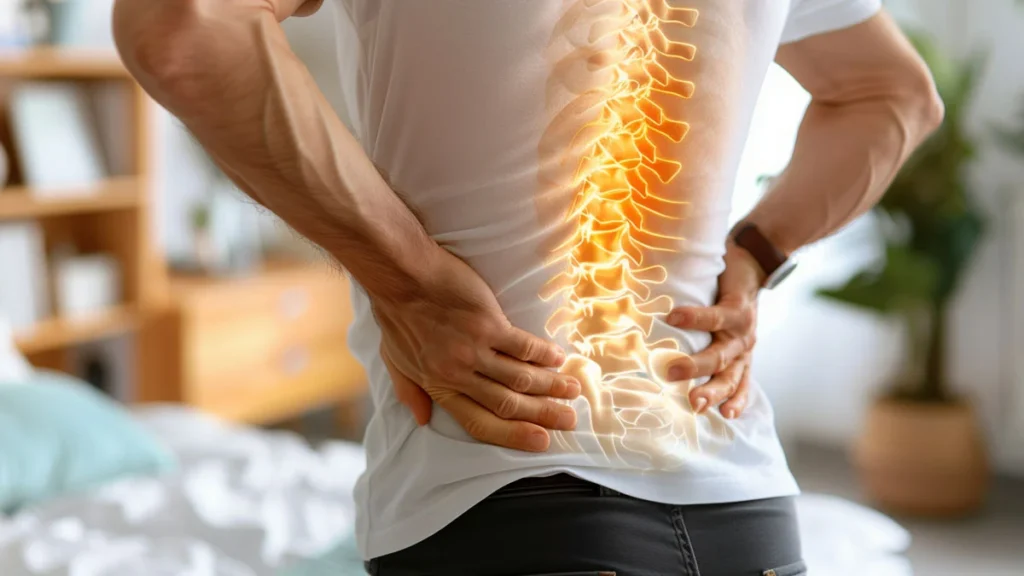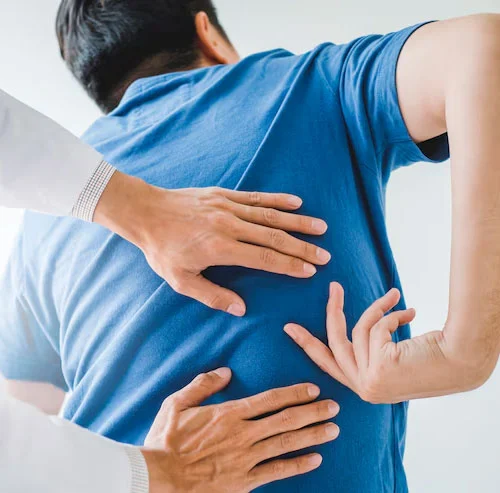
Back Pain: Symptoms, Causes and Treatment
Back pain is any persistent discomfort or stiffness concentrated in that glorious section of our spines stretching from our back through our shoulders. For some people, the hurt stems from structural issues like bulging discs, arthritis, spinal stenosis, or skeletal irregularities slowly compressing and grinding away at the sensitive nerve roots surrounding your vertebrae. For others, it’s a lingering injury, sprain, or muscle strain from accidents, falls, or repeatedly overtaxing your back through work, sports, or poor posture.
Table of Contents
ToggleSymptoms
Back pain have more versatile symptoms than you might think, which includes:
- Dull, achy pains that seem to radiate from one nasty epicenter
- Sudden, sharp, intense pains that stop you dead in your tracks
- Stinging, burning sensations that just won’t go away
- Muscle tightness, stiffness, and tension
- Painful muscle spasms because your back has officially had it
The pain can be localized, focusing its wrath on your upper, middle, or lower back regions. Or it might opt for a more generalized, all-over backache – lucky you! Some people even report the joy of radiating pains shooting from their back down through the buttocks and legs.
But wait, there’s more! You might also experience reduced mobility and flexibility, difficulty standing up straight, or maintaining good posture (hard to blame anyone suffering from persistent back pain).
Main Causes of Back Pain
While the technical triggers can vary from herniated discs to skeletal abnormalities, the root causes of back-related aches and flare-ups tend to boil down to a few usual suspects:
- Poor Posture: From hunching over screens to slumping on couches, sustaining improper spinal alignment is the quickest way to beckon back pain. Over time, this positional stress adds up.
- Excess Weight: Carrying extra pounds, especially around the midsection, can tax the entire skeletal structure and put an exponential strain on the spine’s vertebrae and discs.
- Lack of Exercise: An overly sedentary lifestyle results in deconditioned, weakened back muscles that can’t properly support and stabilize the spine’s movements. Use it or lose it applies here.
- Improper Lifting: Not keeping your core engaged and your spine properly aligned during weight training, household chores, or other lifting activities is basically asking for muscle pulls or disc impingement.
- General Wear & Tear: As we get older, the cumulative effects of gravity and decades of regular stress/impacts can really do a number on spinal joints, bones, and discs over time.
So in many cases, we’re essentially setting the stage for back pain’s insufferable encroachment with our own not-so-friendly lifestyle habits.

Back Pain Treatment
While the excruciating flare-ups may leave you feeling powerless and bedridden, you’re not entirely defenseless against back pain’s torture tactics. With some commitment and consistency, you can take steps to both ease existing aches and prevent fresh insurgencies:
- Move It or Lose It: Targeted stretching, low-impact exercise, and physical therapy can go a long way in releasing tension, strengthening core muscles, and keeping the spine properly mobilized.
- Maintain Alignment: Be conscious of your posture whether sitting, standing, or lifting objects. Aligning ears, shoulders, and hips while engaging your core takes harmful pressure off the spine.
- Apply Ice & Heat: While heat pads can help relax tense muscles, ice packs are optimal for constricting inflamed blood vessels and reducing swelling or spasms. Just apply accordingly.
- Consider Medication: Over-the-counter anti-inflammatories like ibuprofen can temporarily alleviate back pain and swelling. But remember, you should not take any medicine without consulting a doctor. For professional guidance and to know more about back pain treatment options, you should schedule an appointment with Dr. Ravi Gupta, who is one of the Best Orthopaedic Doctor in Mohali.
Seek Professional Help
If you or your loved ones are suffering from back pain, schedule an appointment at Hale Clinics, which provides the best Back Pain Treatment in Mohali. Their physical therapists and orthopedic specialists can help you with non-surgical procedures, exercises, and therapies explicitly designed to remediate back pain.
The most effective eviction notice, however, may simply require a series of smart lifestyle adjustments:
- Achieving and maintaining a healthy weight
- Sleeping on a supportive mattress
- Staying hydrated to lubricate discs and joints
- Quitting smoking to preserve bone/disc health
- Lifting properly with your legs, not your lower back
By being proactive about diet, exercise, and day-to-day strain on the spine, you can make your home a complete no-go zone for that dreaded houseguest.
Conclusion
Our back takes a lot of pressure for us, so pay attention if it’s telling you something is wrong through aches and pains. While back pain can often resolve itself with time, persistent or worsening issues require medical attention.
Your back works hard carrying your body weight and facilitating mobility each day. Show your spine some respect and don’t ignore that nagging backache. Whether it’s upgrading your office chair, reevaluating your exercise routine, or seeing a specialist, make sure to support the very thing that supports you – your back!
FAQs
1. What are the common symptoms of back pain?
Ans. Common symptoms of back pain include sudden, sharp, intense pains, stinging or burning sensations, muscle tightness, stiffness, tension, and painful muscle spasms.
2. What are the main causes of back pain?
Ans. The main causes of back pain are poor posture, excess weight, lack of exercise, improper lifting techniques, and general wear and tear.
3. How can I treat back pain at home?
Ans. To ease existing aches and prevent future back pain, you can try targeted stretching, low-impact exercise, physical therapy, maintaining proper posture, applying ice or heat packs, and considering over-the-counter anti-inflammatory medications like ibuprofen. However, always consult a doctor before taking any medication.
4. When should I seek professional help for back pain?
Ans. If you are suffering from persistent or worsening back pain, it is advisable to schedule an appointment with an orthopedic specialist or physical therapist.
5. What lifestyle changes can help prevent back pain?
Ans. To prevent back pain, consider making lifestyle adjustments such as achieving and maintaining a healthy weight, sleeping on a supportive mattress, staying hydrated to lubricate discs and joints, quitting smoking to preserve bone and disc health, and lifting objects properly using your legs, not your lower back.
